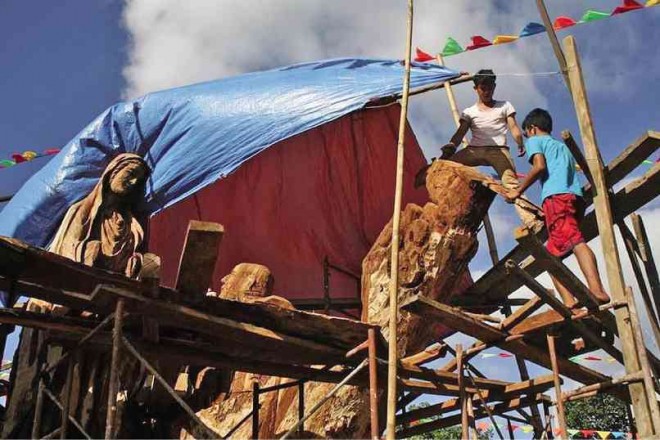
Scientists and artists turn to art as a way of preserving a heritage tree at the Paroquia de Tanay in Tanay town, Rizal province. PHOTOS BY ALEX BALUYUT/CONTRIBUTOR
They may not have saved a century-old dying acacia tree, but a team of scientists, church leaders and artists found a better way of keeping it alive as well as the memories kept by the town of Tanay, Rizal province.
A group of Laguna artists is currently carving the tree’s trunk, which requires eight to nine people to embrace it, to produce a larger-than-life sculpture of San Ildefonso, Tanay’s patron saint.
The tree was one of two said to have been planted by a Franciscan priest on the churchyard of the Paroquia de Tanay. Based on the diameter, both trees are over a hundred years old.
“People (in Tanay) loved those trees,” said Yvette Co, 39, a visual artist based in Los Baños town, Laguna province. “You hear stories from people about their memories of that tree, like of old couples dating under them,” she said.
Co was one of those who designed the more than 13-foot-tall sculpture of the Virgin Mary appearing before the patron saint.
In late 2013, parish priest Noeh Elnar noticed that the acacia trees stopped growing leaves. Alarmed, Elnar sought help from the College of Forestry and Natural Resources of the University of the Philippines Los Baños (UPLB) in an effort to save the heritage trees.
Led by environmental biologist Dr. Nelson Pampolina, a team of UPLB scientists went to Tanay and performed tree surgeries and other procedures over a period of about six months.
“One of the trees has been saved, but the other one was not,” Co said in an interview last week.
A wood-carver from Kalayaan town, Laguna province, helps carve a majestic image of the Virgin Mary and San Ildefonso out of the dead tree.
According to Pampolina, fungi have already grown on one tree—a sign “that the tree’s cells have already weakened.”
This may have been caused by several factors over the years, like strong floods and human activities in the vicinity, he said.
“Despite the chemicals, life nutrients and vitamins, there’s no indication that the tree would have survived. It’s lifeless,” Pampolina said.
“I believe that we are meant to be stewards of God’s creation. To prolong this monumental (tree), now comes the artists’ team,” he said.
The scientists commissioned Co to design the sculpture, together with artists Roel Lazaro from Kalayaan town and Frank Gajo from Paete town, both in Laguna. Five more wood-carvers from Kalayaan have been tapped for the project.
Co said some portions of the tree were pruned and may be turned into other wood sculptures for the church. But the rest of the tree remains where it has always been as scientists treat the wood for the sculpture to last long.
The intricately designed wood carving is set to be unveiled on Jan. 23, as Tanay celebrates its fiesta.
“It’s part of our conservation efforts,” said Pampolina, who described the project as “science, art and culture, and faith” rolled into one.
To Co, reviving the tree into an art form will serve as a lasting “reminder” for Tanay residents “to value their culture and take care of the environment.”